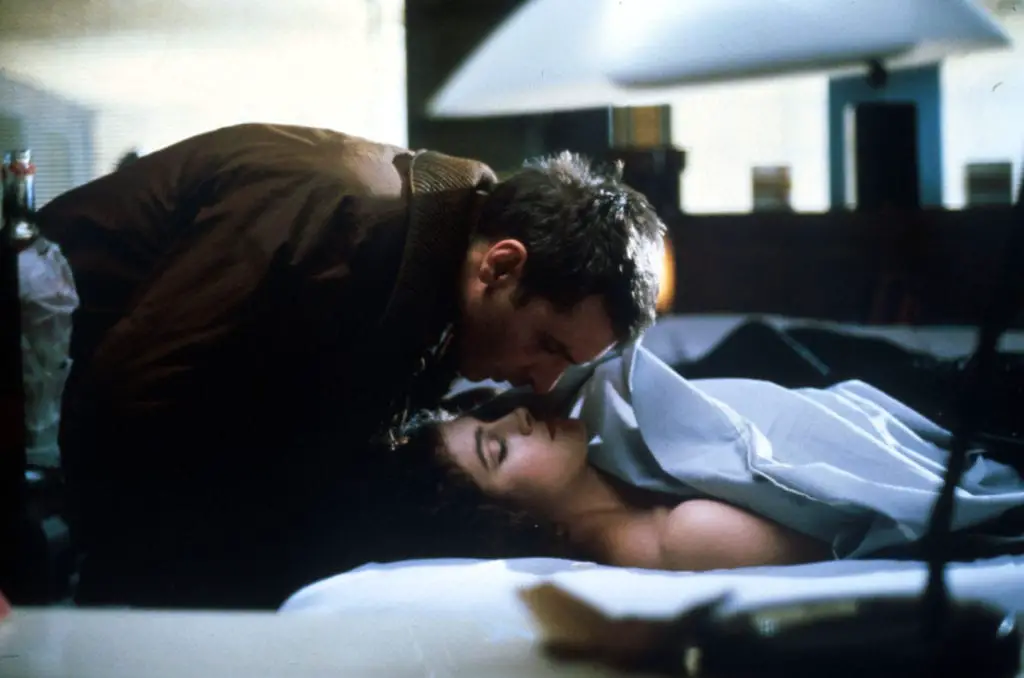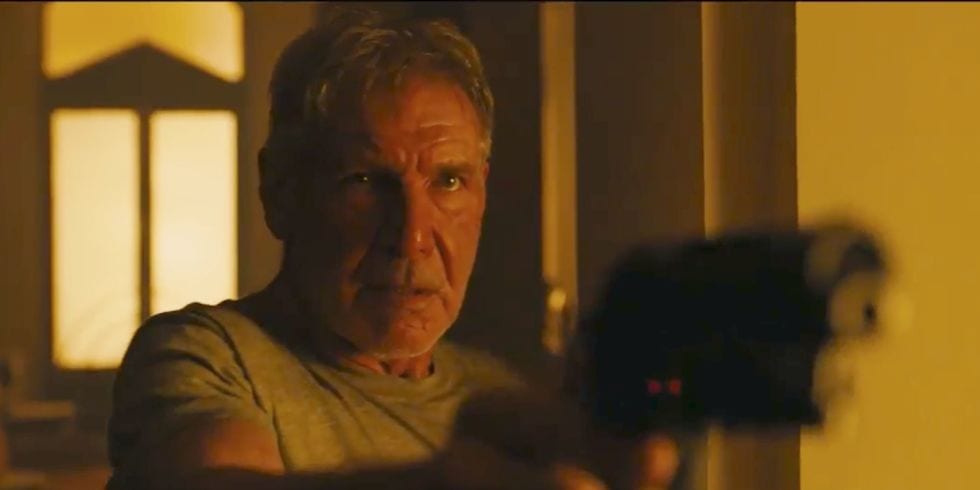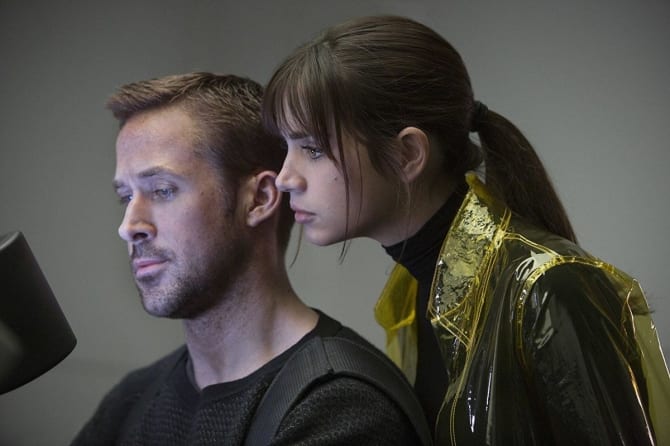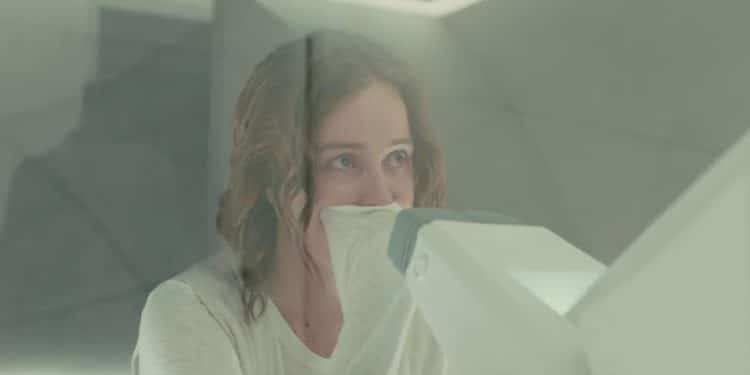Blade Runner — the original one — is a genre classic, featuring memorable lines, a truly great monologue, and last but not least, a dashing anti-heroic Harrison Ford sweeping non-consenting ladies off their feet. It seems no film in the 80s was complete without either that or one of the Holy Trinity killing someone in a particularly brutal way. Not all of those films, however, get contemporary sequels. And out of those that do, not all of them choose to pick the non-consenting ladies as the most important plot thread which to continue from the original.
In fact, I’d venture to say Blade Runner is the only one in this.
It’s a strange choice, to put it very mildly.
The Han and Leia kiss in Episode V is widely criticised, but at least Leia is actually given plenty time to draw away, and we have enough of their interaction in other scenes and films that we know there was no power imbalance between them that would have prevented her from doing so, and that give us additional context. As a result, while we can safely say that that one scene was ill-considered, as a whole their relationship is not really depicted as problematic. Imagine, though, that no episode IV or VI existed (an idea that, I grant you, does have its appeal) and the context of The Empire Strikes Back was the only thing we had to go on for their relationship – and then in episode VII, we’d find out that Rey was actually their daughter, which was why she was the hero.
That is, effectively, what happens with Blade Runner.
In the original film, we see a degree of non-consent that is above the average (even for the eighties with their James Bonds), with the usual fade to black that spares us the necessity to watch the rape until its conclusion. But what we do see really has everything. Rachael, Deckard’s victim, refuses him and tries to run away. He blocks her exit, slams her to the wall, and then forces her to ask for his sexual attention before he proceeds with the rape.
Not only is it so obviously non-consensual everyone should have seen it, it is a particularly disgusting brand of non-consensual, where the last shreds of self-respect are taken from the woman by making her verbally “complicit”. Given that she is a replicant and he believes himself to be human, he is in a position of power over her, and his rape has the added uncomfortable tone of his belief that she does not need to consent because she is not human. But this whole thing is framed as romantic, something one can scarcely believe is possible.
And yet…if you doubt me, watch for yourself.
“Love scene”. Ha. As one commenter points out underneath, the romantic saxophone is such a nice background to a rape!
If this bit of setting isn’t enough to convince you the rape is romanticized by the film, there is also the fact that at the end of the film, we see the couple walking off into the metaphorical sunset, thus cementing the complete lack of awareness of what was just just filmed.
As I said, it’s rather extreme even for the time in which this film was made, but it does not stand out terribly when compared to the many rapes of James Bond or Indiana Jones’s work with the lasso. But it’s considerably more difficult to imagine the film-makers not noticing what was wrong with the scripting today. If they truly did not see it, it’s a seriously alarming testimony to how deep in rape culture we still are. And while things could perhaps be forgiven to 80s filmmakers who were mostly following what everyone else did at the time, no such excuse can be found today, in spite of what all those recent harassment reveals would have one believe.
So given this, why on Earth did they include the “romantic relationship” of Deckard and Rachael as one of the most important storylines of Blade Runner 2049?
Especially when what it does is take the “walk into the sunset” theme even further, having Harrison Ford reminisce about the self-sacrificing love he felt for Rachel and their child, thus glorifying that entire relationship more than it ever was in the original Blade Runner. It is, of course, possible for rapists to believe they love their victims. But the film shows no signs of being aware of this possible discrepancy between Deckard’s romanticised memories and reality.
It gives Rachael no voice of her own, except in a clone that is killed onscreen, because of course it is. The setting, Deckard’s behaviour, the behaviour of everyone around his — all of this confirms that his was a love story for the ages. The only hint that all might not be what it seemed was Wallace suggestion that perhaps Rachael’s love for Deckard might have been manufactured as part of an experiment. To which I say: what love?

But the suggestion does bring me to a point in the new Blade Runner that is a strange echo of this issue. Namely, K’s relationship with his girlfriend, Joi, an electronic product programmed to please him. We first meet her when he comes home from work and she puts dinner on the table, fifties-style. She even takes on the appropriate holographic look for that setting, though she changes it soon.
This introduction seems to indicate that she is merely a product. Yet K treats her as if she was an actual person and he truly loved her. The degree to which she has any kind of autonomy and is capable of acting outside of what would please him most remains doubtful throughout the film. She never makes a single decision that would take her own well-being even into account, let alone as a priority. But it is rather difficult to tell whether that is simply the sexism of the writers at play, or whether she is actually meant to be a mere pre-programmed product.
Even with all this lack of her own agency and, if we are to take her personhood seriously, very problematic implications (why does she act as the perfect subservient wife when we first meet her, if she is not a mere program?), K and Joi are still ten times the love story Deckard and Rachael are. But it is telling that neither of these films was capable of depicting the protagonist in a fully consensual relationship with a fully formed human being. The men, as (maybe) replicants, are allowed full range of human emotion and agency. Their female partners are not.
But back to Deckard and Rachael, and their use by the plot of Blade Runner 2049. This specific parentage was, as I have said, rather important for the question of who was the hero of the story. The idea of the right parentage determining the protagonist is problematic in itself, of course, but fine, Blade Runner 2049 actually gives a sensible enough reason for that. The birth of the hero is, effectively, a miracle, and so the hero can serve as a very good figurehead. But does it have to include romanticizing rape?
The answer to that is always no, obviously. Whenever you find that a story you wrote requires you to romanticise rape, you should reevaluate he life choices that led you to this place and then change your story. But the thing is, even within the general story that was being told, it was not necessary to go in this direction.
Though it would have made using Harrison Ford for fanservice much more complicated, I grant you that much.

The basic story requires that the hero be the child of a replicant. Since it’s a sequel, it makes sense to tie it up with a (human-)replicant couple we saw in the first instalment, and Deckard and Rachael make the most sense. But this is as far as the necessity goes. The child could have just as easily be born out of admitted rape, since I doubt even replicant bodies have the ability to “shut it down”, as some ignoramuses would claim. In fact, it would have added a very interesting layer to the film.
Imagine K having to deal with that discovery when he begins to believe in his own birth. Yes, you had a mother – but the cost of that is that she was raped by your father. Yes, you have a father, but the cost of it is that he raped your mother. It would not have been pleasant — it would have been brutal, in fact — but it certainly can’t be said it wouldn’t have been interesting.
The same goes for the whole movement of replicant resistance that intended to make use of Rachael’s child. They, too, would have to accept the consequences and implications of that. If we believed Deckard was human, it would be enormously strong symbolically. The movement rising against the oppression of humans would be centered on this oppression made manifest in the flesh.
But even if Deckard is a replicant, it works; as I have said, he believed to be human at the time of that rape. We could even have him reflecting bitterly on that, that his treatment of Rachael was directed by his belief that he was superior to her. All of this could have added the emotional depth the film sometimes lacked.
But most importantly, this exploration of the effects of rape would not have been self-serving. It would not have been born out of morbid fascination, or of a GRRM-esque tendency to give every hero a mother that was raped. On the contrary, it would have been a reaction to a situation that already existed. It would be admitting that all was no well in Deckard-land. Instead of erasing the rape in the first film, it would have lampshaded it, and it would have given weight to rape survivors’ experiences.
Rachael being dead is a crucial point in the story and in the investigation, but she could still have been given voice in some way. Her friend could have been present instead, talking about her trauma. Her journal could have been found. Something, anything, to make her experience more visible and to fight the romanticization of rape, as well as the notion that women are chiefly needed to give birth to future messiahs, with no personalities or agencies of their own needed.

That leads me to a wider problem with the new Blade Runner. Its central plot twist is, on the face of it, very feminist; instead of the able-bodied white guy we thought was going to be the messiah the whole time, it’s a disabled woman.
All right, sounds great. It’s like that irritating Lego Movie, only the other way round. It’s not the trope where the overqualified woman has to give way to a man with no qualifications whatsoever. This time, the woman who was beside the hero the whole time turns out to be the important one. Right?
No, not right, because not only was she not beside the protagonist the whole time, she was barely in the film at all. There was one relatively short scene with her, that was all. It works as a punchline to a joke — oh, so it wasn’t him after all, haha — but it works much less as part of an actual narrative.
Because the thing is, K might not end up being the messiah, but from the narrative perspective, he was undoubtedly the hero of the story. It was him we watched. He went through a character arc. It was him we had some sort of emotional ties to. We had very little chance to build something of a relationship to the woman who is revealed as the actual chosen one. In fact, we have more of one to K’s heartless boss or holographic girlfriend.
So given this, what exactly are the implications of the plot twist? It’s a punch in the face of male entitlement, sure. But the thing is, the reason why the omnipresent straight white male hero is bad is because it supports the general impression that he is the only one who has subjectivity, who is an actual person, while all the others around him can be treated as objects serving his heroic journey. So if we want to deconstruct that, it would perhaps be wise to introduce the other characters as actual persons with their own subjectivity.
You know who is introduced in that way? K. Deckard. Wallace, the main villain. The replicant K kills at the very beginning. And all right, to be fair, in two very brief scenes also K’s female boss and the female leader of the replicant resistance.
Never Rachael. Never Joi. And never Ana the chosen one, unless we count the memory she shares with K and which we only get to experience through him.

So given this, Ana comes out of it as less of a hero and more of a possible figurehead of a movement with its own goals outside her control. That, or simply the daughter of some guy. Good at her job, sure, but that was not what the story arc was about, so it’s beside the point.
Not that she is given a choice in which of these it’s going to be, either. K doesn’t ask her if she wants anything to do with them, he simply hides her. He doesn’t ask if she wants to meet her father, he simply leads him there. It seems the only thing she gets to decide is what memories she is going to implant into others’ heads. A rather dubious form of personal autonomy.
Her mother became a symbol to replicants and is now conveniently dead. She herself is a symbol and is conveniently ill in a way that prevents her leaving a specially designed room, and in a world of futuristic technology it seems like no one bothered to give her any form of long-distance communication. Who else do we have, as far as female characters go?
Oh, right…the wife that cannot leave the flat unless K takes her, and who, to boot, in programmed to please him and her own personhood is very much in doubt. Am I sensing a theme?
There is also the sex worker whose body is overlaid by the image of the holographic wife as K has sex with her, and then the semi-villain (his boss) and the complete villain, whose very slow death we get to watch. The boss is by far the most palatable female character, and still most of her personality is formed by obeying the rules of her job.
So this is a film that build upon a romanticised rape to construct a story with hardly any female characters who would demonstrate their own personhood, and plenty of those that are used as props in a man’s story. Even the revelation of Ana’s identity is significant for K, not for her. Suddenly, the plot twist that works like a punchline is not enough to make this film into a feminist one.
Rachel is far from being the only woman whose individual choices are being completely disregarded by these films. In fact, there is not a single woman whose choices are affirmed in their course.
No, wait. I think Joi asks to go out in the rain and K obliges her? Oh joy.

